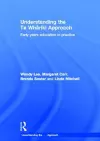
Understanding the Te Whariki Approach
4 authors - Hardback
£130.50 was £145.00
Margaret Carr is Emeritus Professor in the Wilf Malcolm Institute of Educational Research at the University of Waikato in Aotearoa New Zealand, formerly a geographer at Victoria University of Wellington, a potter, and an early childhood teacher. Margaret was a co-director of the project that developed the national early childhood curriculum, Te Whāriki, and has researched and written on early childhood, and learning stories as a narrative method of assessment.
Brenda Soutar Tribal groups—Ngāti Porou and Ngāti Awa. Brenda is part of the group who established Mana Tamariki kōhanga and kura (Māori immersion early childhood centre and school), where she was a leader for several decades. She was also a member of the 2015 Ministerial-appointed Advisory Group on Early Learning. In 2016/2017, Brenda became a member of the writing group for the update of Te Whāriki, the national early childhood curriculum.
Leanne Clayton Tribal groups—Te Āti Awa and Ngāti Rārua.Leanne is a leader at Mana Tamariki kōhanga reo in Palmerston North, Aotearoa New Zealand where she also teaches in the kōhanga reo (0-5 years) and previously in the kura (5-8 years). She also teaches in a Māori immersion early childhood degree programme at a tribal university, Te Wānanga o Raukawa, situated in Otaki, a nearby town.
Bronwen Cowie is a Professor and an Associate Dean of Research at Te Kura Toi Tangata, the Division of Education at the University of Waikato. Her research has included formative assessment interactions in school classrooms; she has a particular interest in student voice and cultural responsiveness, curriculum implementation in science classrooms and collaborations with teachers and students. Bronwen has led a number of national projects using surveys complemented by case studies to highlight the situated natureof learning activities.
Jeanette Clarkin-Phillips is a Senior Lecturer in Education at the University of Waikato. In several research projects on young children, she has explored the ways in which children form relationships with artefacts to make sense of the world and develop a deeper understanding of their citizenship. Her PhD case study thesis was a mapping of a kindergarten community as an affordance ecosystem. She has been actively involved in national early childhood teacher forums.
Shelley Butler Tribal group—Ngati Kahu ki Whangaroa. Shelley is an early childhood teacher with experience in home- and centre-based early childhood contexts. During this museum project, Shelley was a teaching fellow at the University of Waikato and a research assistant at the Wilf Malcolm Institute of Educational Research. Shelley’s passion for research in early childhood was enriched during this project in the collection, management and methods of analysis of the data.